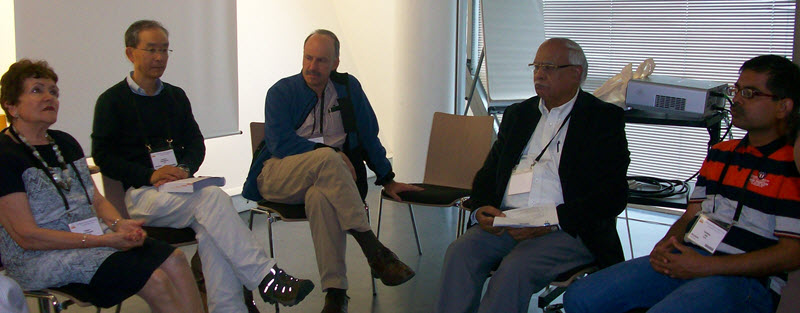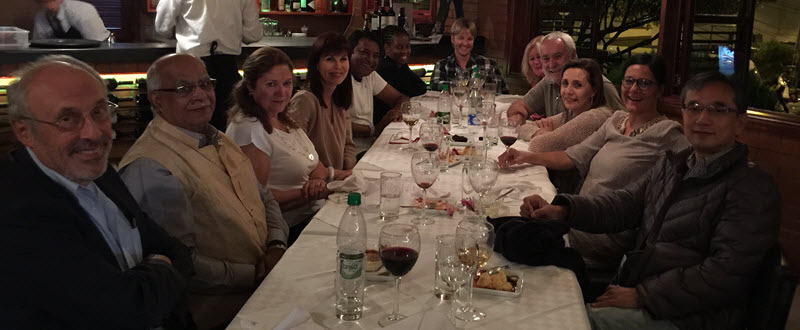Conferences and Meetings
This section shows updates about conferences related to IAAP as well as Division3.
Centennial Congress of Applied Psychology, Cancun, Mexico, December 13-17, 2020 - REGISTRATION NOW OPEN!
Meeting of IAAP Division 3: Psychology and Societal Development
ICAP 2014 Congress Venue, Paris Date: July 9, 2014

Attendance :
Cigden Kagitcibasi, Chair, President 2010 -2013;Susumu Yamaguchi, Past President; Janak Pandey, President 2014-2018; Rolando Diaz - Loving, President Elect; Tushar Singh; Sandeep Jain; Sunil Kumar Verma; Yogesh Kumar Arya; Sandeep Kumar; Shail Shankar
The following is the summary of the business meeting:
- For efficient communication and functioning, it was decided to procure a list of members of IAAP who have opted for the Division 3. It would facilitate in establishing close net-work among the members.
- It was decided to increase membership base of IAAP with joining of Division 3. To achieve it, efforts should be made to identify institutions and individuals workingbroadly in area of Psychology and Societal Development and motivate them tojoin IAAP and opt for Division 3 .
- Greater Participation of majority world psychologists in Div 3 was emphasized. There arepsychologists particularly inAfrica, Asia , Latin America, and Eastern Europe whose interest and work are closer to the objectives of the Division 3.They may not be familiar with the IAAP and Div 3.They should be identified and approached to become member of IAAP and join the Division 3.
- It was decided that the Div 3 should organize a symposium in the RegionalCongress to be held in Columbia in Sept 2015.Prof Rolando Diaz-loving was requested to consider taking up this responsibility. Prof Susumu Yamaguchikindly agreed to consider organizing a similar symposium in the forthcoming congress of the Asian Association of Social Psychology to be held in Philippines. These initiativewill createinterest among the psychologists of the respective region and enlarge the base of membership and possibly may facilitate collaborative work and research.
- The Division 3 is one of the earliest Divisions of IAAP, established in 1978 during the Munich ICAP. The Division, however, has remained dormant and therefore there is a need to take up some activities at international level .The proposal to hold one international seminar on "psychology and sustainable societal development" received enthusiastic support. Janak Pandey volunteered to further work on the proposal and organize it in 2015 in India. It was decided to seek support from IAAP, IUPsyS, IACCP ,and other organizations and institutions . As a follow up, R D-L and JP agreedto liaison with IACCP and IAAP-IUPsyS respectively for support.
PS : After the meeting , JP met President, IAAP andWiley representative for publication of the seminar volume. Wiley has shown keen interest in the seminar and publication of selected papers in a volume.
July 31, 2014
Janak Pandey, President, Psychology and Societal Development of IAAP
Allahabad, India
Symposium Proposal
The First Latin American Regional Conference of Psychology
Armenia, Columbia
September 2-5, 2015

Symposium, with abstracts, at First Latin American Regional Conference of Psychology held at Armenia, Columbia (September 2-5, 2015)
Symposium Title: Psychology and Societal Development
Co-organizer and Co-chair: Janak Pandey, President (India), Rolando Diaz-loving, President Elect, Division 3 – Psychology & Societal Development, IAAP.
Division 3 Psychology and Societal Development of IAAP proposes to organize a symposium to facilitate dialogue leading to understanding and applications of psychological science for societal development. Recently, the sustainable Development Goals (SDGs), set out in the Rio+20 outcome document has been adopted as the UN development agenda beyond 2015 aims to achieve SDGs to impact quality changes in present human conditions worldwide. Some of the global goals covering social, economic and environmental pillars of sustainable development identified are: eradication of poverty, achieving gender equality, education, health and well being for all, peaceful societies, and economic prosperity. The symposium is planned to dialogue contributions of psychological science in achievement of SDGs.
Participants:
Janak Pandey (janakpandey@cbcs.ac.in), (India)
“Contribution of Psychology in Societal Development”
- Ronaldo Diaz-Loving (rdiaz@unam.mx), (Mexico)
- Isabel Reyes Lagunes (lisabel@unam.mx), (Mexico)
- Wilson Lopez (lopezlopezwilson@gmail.com), (Columbia)
“The Role of masculinity and femininity in the construction of gender equality”
“Measuring the Self Concept and Self Esteem of the Mexican”
“Psychology in the Public Sphere: Challenges to the development of sustainable societies (The case of Colombia)”
Abstracts:
- Contributions of Psychology in Societal Development
- The construction of gender identity through education
Rolando Díaz-Loving
National Autonomous University of Mexico
Socially constructed behaviors, individual characteristics, values, beliefs and attitudes are at the core of gender differences and the diversity among males and females (Rocha & Diaz-Loving, 2011). Thus, although sex is biological, gender is learned and reproduced across the individual’s life. Considering there are some critical periods in which the psycho-socio-cultural development of these sexual specific behaviors, attributes, attitudes and values are emphasized, creating the rules and the social expectations related to their differences through specific socialization and interaction practices, in the present study, 100 males and 100 females from 5th grade, 200 more from 6th grade and in equal numbers grades 7th through first year of college responded to a battery of tests which included masculinity and femininity scales, adherence to socio-cultural premises and achievement and reading skills measures. In a first stage, in order to measure each dimension in a valid, reliable and cultural sensitive form, qualitative studies were followed by the development of several inventories. Mean differences show consistent differences by sex and educational level in which more egalitarian and androgynous orientations appear in females and all subjects with more formal education. The results are discussed in terms of the impact of culture on the definition of gender.
- Measuring the Self Concept and Self Esteem of the Mexican
- Psychology in the Public Sphere: Challenges to the development of sustainable societies (The case of Colombia)
Janak Pandey
Allahabad University, India
Although, psychology’s potential in national development was recognized as early as in the 1950s (Kleinberg, 1956; Murphy 1953), the progress of the discipline has been such that it has not yet fully achieve its role. To make psychology useful for societal development the discipline required conceptual and methodological shift. The discipline has been slow and less productive in socio-culturally appropriate research relevant for applications facilitating societal development .It is well recognized that economic development is a tool and ultimate goal has to be providing at least a minimally acceptable sustainable quality of life in harmonious -just society under healthy environment.In the past five decades or so psychology has enhancedknowledge base enabling our understanding of community development and social change ; intergroup relations and resolutions of social conflicts; socio-economic inequalitiesand social justice ;man-environment relationship; etccritically significant in facilitating societal development and nation building.
Isabel Reyes Lagunes
National Autonomous University of Mexico
Since the time of the Spanish conquest, in Mexico there exist several documents in which we can find descriptions of the way Mexicans behave, like those of monks and some chronicals. But it is not until the end of last century that Ezequiel Chávez made serious attempts to describe, recognize and understand the way Mexicans are and behave. The interest in this task has been of the concern, among others, of philosophers, sociologists, historians, anthropologists, psychoanalysts, psychologists and writers. As it would be too extensive trying to make an exhaustive review of the various approaches just mentioned, we have choosen only three of them: the philosophical, psychodynamical and the etnopsychological as it can be considered among the most relevant for the measurement of personality in Mexico.
The pioneers of this concern to understand Mexican´s behavior were philosophers and we can find two fundamental tendencies. The first one represented, among others, by Alfonso Reyes and Jose Vasconcelos, which perspective is based on the idea that all philosophy is determined by the peculiar circumstances in which it occurs.
The second tendency is represented by Leopoldo Zea who thinks that the main problem is trying to know the peculiarities of the Mexican in a universal context. The philosophical perspectives share the continuously highlighting of the negative aspects of the Mexican: Samuel Ramos refer to the Mexican as the inventor of artificial destinations (1951); having a deep feeling of minor value, as Iturriaga declared (1951); Uranga refers to a way of reluctance; besides it is not clear to what king of Mexicans do they are talking about (region, social level, etc.).
When Santiago Ramírez presented his book “The Mexican: the psychology of his motivations” interest arouse to interpret behavior from a new approach: psychodinamical. For him (1959), most of the perturbations of the Mexican nowadays are due to the crash of two cultures: indigenous and Spanish in which the first is subjugated by the second who is the dominant and strong that can be reflected even today in attitudes (malinchismo) as well in verbal expressions (modisms, jokes, etc.).
Díaz-Guerrero (1994) through his systematic approach integrating socio-cultural norms and beliefs to the study of the development of personality, a discipline he called ethno psychology, inspired the need to evaluate the Self-concept and Self- esteem of the Mexicans in a valid, reliable and culturally sensitive and relevant conceptualization and measurement to verify or correct the personality characteristics attributed to them. Based on his work, Reyes Lagunes (1993) and other have developed psychometric measures. In this presentation I’ll expand on characteristics of these measures and their theoretical and applied value.
Key words: Personality, Self-concept, Self-esteem, Ethno Psychometry, Mexicans
Wilson López López
Pontificia Universidad Javeriana, Columbia
Psychology faces numerous challenges nowadays. Like never before, the discipline is experiencing demands made by communities, branches of states (executive, legislative and judicial), regional and local governments, and society at large, to apply psychological knowledge to their domains of interest. As an example, the Colombian College of Psychologists has been frequently consulted on controversial issues that are critical to social dynamics; these requirements have been made by the Constitutional Court (judicial), for instance, when making legal decisions. The different ministeries (executive) often request the presence of the College and other entities in situations related to healthcare or education. Congress (legislative) is also increasingly recurring to Psychology as a source of perspectives for the law making process. These new dynamics have an effect on the many challenges faced by Psychology as a discipline in terms of generating research and evidence, seek solutions to diverse social problems, improve societal processes and achieve better communication of Psychological knowledge in order to contribute to the development of sustainable societies. The current work will present specific examples of these dynamics, and the challenges faced by the discipline to meet these demands.

